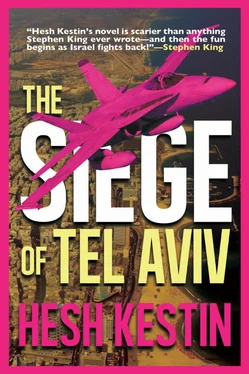8 AM: Breakfast, overnight briefing
9 AM: Skeet shooting
11 AM: Lake swim
1 PM: Working lunch [w/ F Spier, Congressional Leaders per appendix]
3 PM: Nap
5 PM: Trail riding
7 PM: Security update [F St. George, Joint Chiefs]
8 PM: Continuing through dinner
10 PM: Movie: Dead Sure [Leonardo di Caprio, Holly Mawn]
Midnight: TV news highlights, tomorrow’s daily papers
The president is especially interested in tonight’s film, a version normally shown only to movie industry insiders, in which the fellatio scene is unedited, uncut, and—according to the president’s Hollywood liaison—fucking unbelievable.
AS COL. LIOR AND his staff go over diagrams of the target site, Connie Blunt and her producer step into first class.
“Hate to be a party pooper, colonel,” she says. “But it happens CNN bought us three seats in this section. You and your men are in them.”
Col. Lior is amused. “And?”
“We’ve been deposited in business.”
“I’ll see you get a refund. Please return to your seats.”
“Come on now, colonel.”
“Or we could lock you in a toilet.”
Like Blunt, her producer did not get where he is because he is easily contained. “It’s just the three of us,” Terry says. “For cryin’ out loud, we’re press. Unarmed.” He smiles. “Except for cameras.”
“You know what it means, chutzpa?” Col. Lior asks.
“Audacity,” Terry says. A Puerto Rican, he grew up with Jews in New York. “Impudence, outrageous nerve. We have a proposition.”
“You have a proposition?”
So it is that a visual record of Operation Baby Candy—as in the taking of the latter from the former—will come to exist, a collection of digital B-roll whose fate at the moment is as uncertain as the outcome of the mission itself.
“This is Connie Blunt aboard Kuwait Air flight 201 en route, we have been told, to Kuwait. Myself and my CNN crew were awaiting takeoff from Yasser Arafat Airport in former Israel when the plane was stormed by Egyptian commandos.”
Buddy Walsh, Blunt’s cameraman, pans business and coach—by agreement, first class is out of bounds—picking up soldiers and pilots napping, playing cards, cleaning weapons, before returning to Blunt. “The commandos were not Egyptians. They are in fact Israelis.” Buddy picks up an IAF pilot zipping his pants as he leaves a toilet.
“So far I have not been permitted to interview anyone aboard, including the flight crew. You should also know that as a condition of being able to shoot aboard this aircraft, our footage is to be handed over to Israeli military censors in Tel Aviv. This suggests that our plane will be returning to Tel Aviv. Such a situation is simply impossible to imagine. As is widely known, Israel’s former first city, its New York as it were, is now its only city. Surrounded, short of food and—it is widely believed—with no viable military capability—”
Blunt’s assessment is interrupted by three electronic chimes. “Ladies and gentlemen, this is your captain speaking. We are preparing for our scheduled landing at Kuwait International Airport. It is imperative that passengers cease moving about the cabin, return your seatbacks and tray tables to their upright position, and pray to God Almighty that someone here knows what is going on, because I surely do not. We are on schedule and cleared for landing. Air crew: emergency procedures are now in place. I am advised that fore and aft hatches may be opened before the aircraft comes to a full stop, along with emergency exits port and starboard. God save us all.” Seeing that the commandos and air force personnel are strapping themselves in, Blunt and her cameraman and producer scramble for their seats. She attempts to make sense of the landscape through the window but the airport shows nothing unusual as the plane extends its flaps and prepares to land.
If Blunt could see what the captain sees as he makes his approach, it would be this: the standard airport runway, with jetliners and cargo carriers lined up to the right, and ahead of the plane and a bit to the left, a military airport. This is Al-Mubarak Air Base, home to the pride of the Kuwaiti Air Force, sixty F/A-18s in ready formation beyond a chain-link fence topped with barbed wire.
On instruction from Col. Lior, the 717captain has kept the circuit to the cabin open, so that everyone in the rear of the plane can follow events as they happen. Col. Lior prefers to keep his people apprised. Should there be a problem, he does not want to have to waste even seconds with an announcement.
The 717 captain’s voice comes on. “Kuwait Air 201 to Tower, we’re at 1500 feet beginning approach Runway Two. Request final clearance. Over.”
The tower officer has an English accent, not unusual in Arab aviation, where experienced expat personnel are normally responsible for airport operations from tower to maintenance. “Tower to Kuwait 201. You are cleared for Runway One, repeat Runway One. Pull up and come around. Over.”
“Kuwait 201 to Tower. Negatory on that. Landing gear is descended and seems to be locked. Permission for Runway Two. Over.”
“Tower here. Roger that. Kuwait 201, you are cleared for Runway Two. Repeat, now cleared for Two. Good luck. Over.”
“Roger that, Tower. Looking good at 700 feet and descending. Over.”
“Looking good, 201. Over.”
In the cockpit, the 717 captain switches off his radio. “Colonel, you get us out of here in one piece and I’m going to buy you a really nice bottle of wine.”
Col. Lior braces against the doorway. “You know what you have to do, captain. Just do it. Or none of us will ever drink wine again.”
The aircraft touches down smoothly, the kind of landing that normally would bring a scattering of applause from passengers.
Col. Lior picks up a mic and turns back into the first-class cabin. “Boys,” he says quietly, his voice reverberating through the plane, “this aircraft is stuffy. Ventilate it!”
The commandos are already on their feet, the pilots among them remaining strapped in. As the 717 rolls down the tarmac, they fling open all its doors and emergency exits. The plane continues to slow—and then abruptly speeds up, the aircraft shuddering momentarily as it breaches the fence between the civilian and military airfields, and slows again, its powerful brakes whining. On either side are the parked F/A-18s.
The 717 is still rolling when its emergency slides descend and inflate, the commandos gliding down the soft plastic like manic children in a swiftly moving playground, some setting up machine guns in static defensive position while others aim their guns at the barracks and admin buildings to the right. From these buildings there is no reaction. Either they are empty or the base personnel are still asleep.
In her seat, Blunt now hears the tower officer’s voice relayed through the plane’s loudspeakers. “Tower to Kuwait Air 201. Have you gentlemen been drinking? You’ve overshot into military area. Taxi back. Over.”
“Kuwait 201 to Tower. My bad, y’all. Sun in eyes. Rolling back. Over.”
But Kuwait Air 201 is not moving. Instead Blunt watches in fascination as the aircraft empties, the pilots now sliding to the ground and, under cover of the commandos on the tarmac, sprinting for the parked F/A-18s. She is glued to the window, not unaware that doing anything else is likely to get her killed. She must be scared, she knows, because she is hallucinating: one of the pilots sliding right under her window appears to be wearing bright red lipstick.
Alex would have preferred heels as well—nothing slutty, just three inches or so—but then she would not be able to sprint to the third F/A-18 on the right. Unlike most of the other pilots, whose only experience with that aircraft is from intense instruction in Tel Aviv’s central bus garage, Alex is familiar with the plane, having evaluated it at its production facility in Fort Worth. He was one of the instructors in a two-day ground school as the pilots worked simulated dashboards made of cardboard and bits of plastic.
Читать дальше












